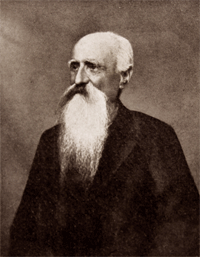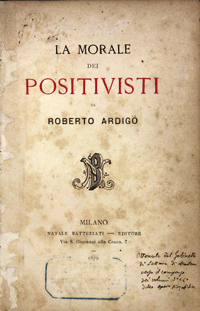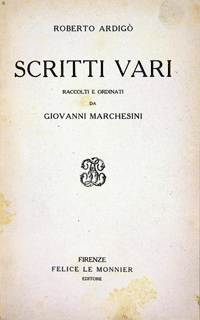



Roberto Ardigò
Casteldidone (Cremona) 1828 - Mantova 1920
The main exponent of Italian positivism, he undertook the study of the classics at Mantua, where he became a priest and taught philosophy at the episcopal school. Following a religious crisis he abandoned the faith and the priesthood in 1871. In 1881 he was called to the university of Padua to occupy the chair of History of Philosophy, where he remained until 1909 when he asked to retire. He remained active, publishing a number of articles in the «Rivista di filosofia e scienze affini». After falling into a profound depression, he was brought back to Mantua in 1918 where he died after an attempted suicide. Bibliography: G. Marchesini, La vita e il pensiero di Roberto Ardigò, Milan, Hoepli, 1907; A. Levi-L. Limentani, Bibliografia ardighiana, «Rivista di filosofia», XIX (1928), pp. 400-428; F. Amerio, Ardigò, Rome, F.lli Bocca, 1956; A. Bortone, Ardigò, Roberto, in Dizionario biografico degli Italiani, Rome, Istituto della Enciclopedia Italiana 1962, vol. IV, pp. 20-27; W. Büttemeyer, Roberto Ardigò e la psicologia moderna, Florence, La Nuova Italia, 1969; Roberto Ardigò nella cultura italiana ed europea tra Otto e Novecento, n. monogr. «Rivista di storia della filosofia», I (1991); T. Pironi, Roberto Ardigò, il positivismo e l’identità pedagogica del nuovo stato unitario, Bologna, Clueb, 2000; A. Savorelli, Ardigo, Roberto, in Il Contributo italiano alla storia del Pensiero. Filosofia, Roma, Istituto della Enciclopedia Italiana 2012.
The “R. Ardigò” section of the Biblioteca Universitaria in Padua
The library of Roberto Ardigò, which contains both printed texts and the personal archive of the philosopher (autograph manuscripts of his works, letters and other material) passed into the hands of his pupil Giovanni Marchesini after his death, and Filippo Canal aquired it from Marchesini’s heirs. In turn, Filippo’s heir, Pietro Canal offered the collection to the Biblioteca Universitaria, which acquired it in 1984. The library had already acquired some of Ardigò’s manuscripts from antiquarian booksellers in 1935. The library also includes a significant number of printed books which belonged to Marchesini, and it is not always easy to distinguish them from the original collection. Section A: Works that definitely belonged to Ardigò, Works by Ardigò Bibliography on the library: G.P. Mantovani, Le “carte” del filosofo. Il fondo “R. Ardigò” della Biblioteca Universitaria di Padova, Trieste, Lint, 2003 (this article only deals with the personal library of the philosopher).
The Inventario topografico della Biblioteca Ardigò concerns only the printed books, and according to Filippo Canal’s description contains 275 books which definitely belonged to Ardigò and possess notes in his hand, another 450 which definitely belonged to Marchesini, 1700 volumes on philosophical subjects from between the end of the nineteenth century and 1920 which probably belonged to Ardigò, and large quantity of offprints.
The topical index of the library, which is entirely conserved in a section called “Biblioteca Ardigò”, is subdivided in four sections according to these distinctions:
Sezione B: Works donated by the author or publisher, books and journals of uncertain provenance, works that belonged to Marchesini, works by Marchesini
Sezione C: Periodicals
Sezione D: Pamphlets and offprints